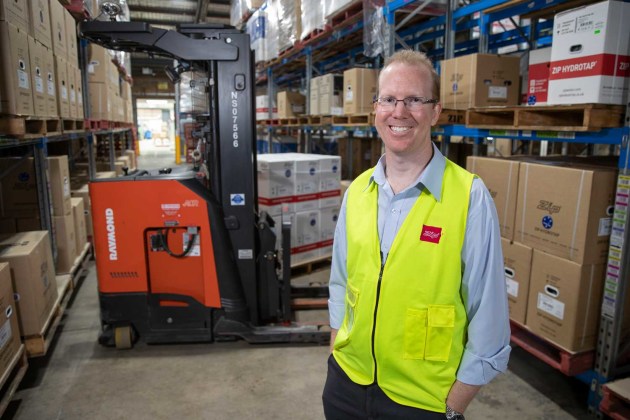Australian brand Zip Water recently acquired a fleet of new Toyota Material Handling equipment to support its investment in an expanded production line that is to increase output of its flagship HydroTap range.
Zip Water exports drinking water systems to more than 70 countries. The company manufactures its products in a factory in Condell Park in Sydney’s west.
Zip Water head of supply chain Glenn Bucknell said after being acquired by global water treatment company Culligan in 2017, Zip Water has launched into new markets, including the US and China.
“Culligan brought us an avenue into the US, so we had huge potential for volume growth, and they encouraged us to up-scale our manufacturing footprint,” Bucknell said.
“We made a significant investment in our new production line to scale up our output.”
To support its expansion plans, Zip Water updated its fleet of material handling equipment. It now includes four Toyota 730-DR32TT Double Deep Reach Trucks; two 8FBE18 and one 8FBN25 Toyota Battery Electric Counterbalance forklifts; Toyota Sprint elevated work platforms; Toyota Walkie Stackers; and a Toyota 32-8FG30 LPG Counterbalance forklift with Cascade hydraulic fork-widening attachment.
“We were gearing up our physical infrastructure and our material handling equipment was a further extension of that, because it’s a big part of our processes,” Bucknell said.
Zip Water formerly had an ageing fleet from another supplier and a mix of owned and leased equipment. Bucknell saw the plant expansion as an opportunity to update and streamline the company’s material handling equipment and sought advice from Toyota Material Handling Australia (TMHA) and one other supplier.
Bucknell said the previous fleet's repair and maintenance costs were increasing, and it was becoming inefficient to retain the old equipment.

“We adopted a model with Toyota to enable us to lease all our equipment. That gives us the latest technology and servicing at a fixed price with no surprises and gives us the flexibility to change the mix of our fleet and scale up according to business needs,” Bucknell said.
“It no longer made sense for us to invest in the outright purchasing of equipment because, with a business changing as rapidly as ours, we don’t know what we’re going to need in five years’ time. So, having the flexibility that Toyota provides was attractive. It’s reassuring to know that we have a partner that can meet our needs as our business grows.”
TMHA NSW major account manager Michael Provan said TMHA always tries to understand how customers’ businesses operate to make recommendations to help increase operational efficiencies and safety.
“In Zip Water’s case, it was about modernising their fleet and adopting a leasing with fixed-servicing costs model to provide greater transparency and peace-of-mind that they weren’t going to get any performance issues that could result in significant downtime - an especially important consideration for manufacturing facilities,” Provan said.
“They had a very particular manufacturing and handling step that was a real bug-bear for them in terms of their old forklift that had a fixed attachment. We were able to solve the issue for them by recommending a Cascade hydraulic fork-widening attachment which not only improved the efficiency of the process and the safety afforded by avoiding manual handling, it also dispensed with a secondary machine, entirely.”
Zip Water’s Bucknell said two machines were formerly required to perform duties in the plant’s sheet metal production area.
“It was challenging for us because we were maintaining two separate machines to do different aspects of the tasks, and the process of manually loading and unloading machines was a risk-point for us,” he said.
“With the new Toyota forklift having a customised mechanical fork-spreader attachment, it was like having two machines combined into one. We were able to get rid of one machine off the floor which helped from a cost and an efficiency perspective, but also solved a safety issue for us by removing a manual-handling risk. It’s really enabled us to take that process to the next level.”
Bucknell said it is essential to have a partner that clicks with the business, and that partner can take care of all servicing details.
“It helps that all our Toyota equipment can be serviced in the one visit,” he said.
“It’s also great to have the peace of mind that fixed servicing costs brings; we know exactly what we’re paying every month. There are no surprises in terms of cost or machine performance. Downtime is a killer for us so having the reliability of the new Toyota machines is a welcome relief.”
Bucknell said every time a new machine was delivered, it has worked brilliantly.
“The feedback has been overwhelmingly positive,” he said.
“A lot of our guys have never operated brand-new equipment, so they get pretty excited about it. In many ways, it has helped our people to feel more engaged in their work. It’s an investment around them and helps them feel part of a business that’s performing well.”
Toyota Material Handling Australia is a member of the Australian Packaging and Processing Machinery Association (APPMA).






